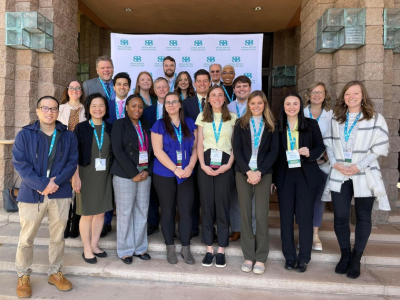 At the largest World Congress on Spina Bifida Research and Care (SBWC) in event history, representatives from the University of Alabama at Birmingham and Children’s of Alabama made up 17% of the total platform presentations, with 23 oral and 13 poster presentations.
At the largest World Congress on Spina Bifida Research and Care (SBWC) in event history, representatives from the University of Alabama at Birmingham and Children’s of Alabama made up 17% of the total platform presentations, with 23 oral and 13 poster presentations. The SBWC, held this year on March 22-25 in Tucson, AZ, is the sole international conference that focuses entirely on researching, addressing practical challenges and finding real-world solutions for those affected by spina bifida. Every five years, spina bifida patients, their families and caregivers, healthcare providers and advocacy groups gather at the SBWC to share the latest findings in spina bifida research.
Members of the UAB Medicine community were involved at all levels of the event, with Professor and Chief of Pediatric Urology David Joseph, M.D., and Spina Bifida Association (SBA) Professional Advisory Council members Pediatric Neurosurgery Division Associate Professor Brandon Rocque, M.D., MS, and STEP Program Director and Spina Bifida Program Director Betsy Hopson, MSHA, all serving on the SBWC planning committee.
Faculty members from various departments, researchers, program managers and medical students in the Heersink School of Medicine all came together to represent UAB at the SBWC.
“Creating a learning environment that instills confidence in our students is essential to their future success, so we encourage them to take every opportunity to present their research,” said Department of Neurosurgery Clinical Research Manager Anastasia Smith, MPH. “Presenting at a major conference can be intimidating, but I think that our students’ willingness to participate speaks to the culture that our attending physicians have created.”
Smith, alongside Hopson, was instrumental in ensuring each student was fully prepared to present their abstract submission(s).
On the third day of the SBWC, Rocque served as the moderator for the Neurosurgery B Breakout Session and UAB hosted the by-invite-only Neurosurgeons’ Meeting. Key research topics presented by UAB and COA representatives included prenatal, postnatal and lifetime care, hydrocephalus, adult care clinics, treatment safety, myelomeningoceles and more.
Professor and Pediatric Division Director in the UAB Department of Neurosurgery Jeffrey Blount, M.D., MPH, delivered an oral presentation discussing recent advocacy initiatives by the Global Alliance for the Prevention of Spina Bifida (GAPSBiF), a global coalition for food fortification as a means to reduce the incidence of neural tube defects.
“Our students did a fantastic job representing UAB. The SBWC is a meeting that only comes along every five years and there are many countries and institutions represented. Throughout the event, there were discussions in each room about how to build what UAB has done,” said Hopson, who has worked at UAB for nearly two decades. “It was an honor and such a source of pride to share our students on a global stage. The Heersink School of Medicine has so much to be proud of with this group!”
Under Hopson’s leadership, the UAB Spina Bifida Clinic has been funded by the CDC for the National Spina Bifida Patient Registry (NSBPR) since the registry’s inception and enrolled more participants with more complete data than any other center in the U.S.
The 2023 SBWC hosted nearly 500 attendees representing 18 countries, 35 U.S. states and the District of Columbia and more than 100 health and research institutions worldwide. Sharing spina bifida research and advocating for patients globally is essential in the fight against healthcare disparities on a global scale. By including patients and their families and caregivers in this exchange of knowledge, spina bifida advocacy is expanded to help identify gaps in care and develop strategies to address them, regardless of a patient’s location or socioeconomic status.
SBA Medical Director Timothy Brei, M.D., welcomed spina bifida patients and their advocates saying, "You are the reason we are here. Your input into research design and participation in research is crucial."
UAB has made significant progress in spina bifida care over the last three decades. In 1993, UAB established its first spina bifida care program, making it one of the longest standing programs in the country, and by 2006, had gained recognition as a premier spina bifida care provider.
In 2012, UAB formed a partnership with COA, creating the Lifetime Care Model, ensuring a seamless transition from pediatric to adult care. The UAB Transitional Spina Bifida Clinic, one of the only clinics of its kind, is supported by the Departments of Physical Medicine and Rehabilitation, Neurosurgery and Urology.
In 2020, the UAB Adult Multidisciplinary Spina Bifida Clinic received one of the first SBA Clinic Care Partner designations.
“UAB has the only spina bifida program in the Southeast region that provides multidisciplinary care for individuals with spina bifida for their entire lifespan,” said UAB Department of Physical Medicine and Rehabilitation Vice-Chair of Clinical Operations and Adult Multidisciplinary Spina Bifida Clinic Medical Director Danielle Powell, M.D. “Our team is also dedicated to ameliorating the health challenges faced by our patients, which is evident by our representation at the 2023 SBWC.”
This article was written in collaboration with the Department of Physical Medicine and Rehabilitation.